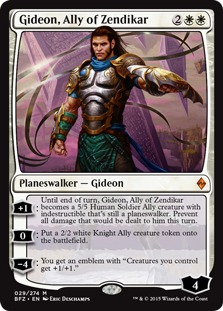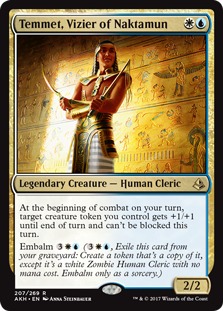Against the Odds: Glorious Superfriends (Standard)
Hello, everyone. Welcome to episode eighty-six of Against the Odds. This week, we have an unintentional special episode—last week, we were supposed to play Glorious End, which cruised to victory on the Against the Odds poll, but we had to substitute in New Perspectives at the last minute thanks to a bug on Magic Online. Thankfully, Wizards fixed the bug a few days ago, so this week, we're heading to Standard to see if we can end some opponents' turns with Glorious End! Then, at the end of the episode, we'll get back on track with our poll, so don't forget to vote! Exactly how to abuse Glorious End in Standard is another concern, so let's just say our plan involves planeswalkers—lots and lots of planeswalkers! We'll talk more about it in a bit, but first let's get to the videos.
A quick reminder. If you enjoy the Against the Odds series and the other video content here on MTGGoldfish, make sure to subscribe to the MTGGoldfish YouTube Channel.
Against the Odds: Glorious Superfriends (Deck Tech)
Against the Odds: Glorious Superfriends (Games)

The Deck
There are two main concerns when it comes to playing a Glorious End deck in Standard. First, we have to have a good plan to stay alive after we cast it, because while ending our opponent's turn at an inopportune time has the potential to be very powerful, it's not worth it if we die on our next end step, no matter how good it may be. Second, we have to figure out a way of abusing the effect of Glorious End, which, once we have the drawback taken care of, is pretty similar to an extra-turn spell with the upside of being able to start this turn whenever we want (for example, while our opponent has a spell on the stack, effectively countering the spell). Thankfully, there is one fairly obvious way to abuse Glorious End, and that's with the help of lots and lots of planeswalkers.

As for Glorious End itself, the easiest way to think of it as a Time Warp that we cast on our opponent's upkeep, with the downside of letting our opponent untap their lands (which is only really important against counterspell decks). While this is sort of the first-level view of the card, it can sometimes do much more. For example, if our opponent casts an Ulamog, the Ceaseless Hunger, we can cast a Glorious End and not only exile the Ulamog, the Ceaseless Hunger but the exile trigger as well. More importantly, it's an extra-turn spell that gives us a lot of flexibility. Since we can cast it at instant speed, we can wait to see what our opponent does with their turn. If they play a big threat, we can end their turn and start our extra turn; if they simply land-go, we can save our extra turn for the next turn cycle when we can get more value. Of course, this all comes with the big downside of losing on our next end step, but we have some plans to survive the potentially lethal trigger.
Surviving Glorious End



Our primary plan for surviving Glorious End is the emblem from Gideon of the Trials, which makes it so we can't lose to anything (including the Glorious End trigger) as long as we have a Gideon on the battlefield. Since having a Planeswalker — Gideon on the battlefield is so important, along with Gideon of the Trials to make the emblem, we also have the full four copies of Gideon, Ally of Zendikar, which is not only a Gideon but a really powerful Magic card, offering a fast clock and endless token production for chump blocking and eventually attacking.
As a one-of backup plan, we have Exquisite Archangel, which isn't a good way to survive Glorious End because it has to exile itself, but it technically does keep us alive. The main reason the Angel's in our deck is because we can tutor it up with Nahiri, the Harbinger's ultimate as a last-ditch attempt to stay alive when everything else goes wrong.
Winning the Game with Glorious End





I'm not going to take the time to break down the abilities on all of our planeswalkers because the actual effects aren't all that important to our deck (although it's worth pointing out a couple of tricks: Nahiri, the Harbinger's ultimate can tutor up our Exquisite Archangel, and Nissa, Vital Force's −3 is good at getting back a Gideon from our graveyard to keep our emblem active). Instead, let's discuss the value of planeswalkers with Glorious End from a meta perspective.
If we look at Glorious End as an extra-turn spell, the second part of making sure the card is powerful is having something to do during our extra turn, and planeswalkers are the best option in Standard. Having a planeswalker (or four) on the battlefield is like having an extra card (or four) in hand that we can cast for free, since we can use the extra turn to activate the abilities on all of our planeswalkers an additional time. More importantly, each extra turn gets us one activation closer to ultimating our planeswalkers, which is one of our primary plans for winning the game.
So, how do we win the game with the combination of Glorious End and planeswalkers? Two ways, actually. First, we can win by beating down with our planeswalkers. Being able to attack with Gideon, Ally of Zendikar, an animated land from Nissa, Vital Force. and a couple of Chandra, Flamecaller tokens closes out the game quickly, especially when we can do it a few turns in a row. Second, we simply use our extra turn to ultimate planeswalkers like Chandra, Torch of Defiance, which is pretty guaranteed to close out the game in short order.
Ramp and Fixing



Servant of the Conduit and Channeler Initiate are in the deck to help us ramp into our planeswalkers and Glorious End, and are actually pretty important because our deck is fairly expensive, and if we don't start playing planeswalkers until Turn 4, it's pretty easy to get run over by aggressive decks. Meanwhile, Oath of Nissa is great mana fixing for our planeswalkers and helps us find our Gideon of the Trials to combo off with Glorious End.
Removal



Sweltering Suns and Fumigate take advantage of the fact that we have few real creatures, allowing us to sweep away our opponent's board at very little cost to ourselves because we'll (hopefully) have a bunch of planeswalkers left over on the battlefield. Cast Out, on the other hand, gets rid of anything that might be a problem, from a Toolcraft Exemplar to an Ulamog, the Ceaseless Hunger.
The Matchups
The matchups are pretty straightforward with Glorious Superfriends. We are pretty good at grinding against midrange and slower aggro decks, with the possible exception of Zombies, which can go so wide that the horde can overwhelm our planeswalkers if we don't have a wrath. Being able to activate a bunch planeswalkers every turn, with many of them making tokens, is hard for random creature decks to fight through. Control is actually similar: we only need to stick one or two planeswalkers to close out the game, which means that we should win if we ever draw more planeswalkers than they draw counters.
On the other hand, fast aggro decks can be a problem, especially if we have a slow draw or our opponent can kill our Turn 2 mana dork, and even worse is Aetherworks Marvel decks, which don't especially care about our planeswalkers and can win through our Gideon of the Trials emblem thanks to Ulamog, the Ceaseless Hunger eating away our library (we wouldn't technically die to having an empty library; instead, we wouldn't have a card to draw for our turn, which means we'll run out of resources sooner or later and lose our Gideon and the game). The only good news is that our combo of a Gideon of the Trials emblem plus Glorious End can be very good against Ulamog, the Ceaseless Hunger if we happen to draw it, since it doesn't just counter the Ulamog, the Ceaseless Hunger but the triggers as well.
The Odds
We only ended up getting in four matches this week because a lot of our games went super long—apparently, Glorious End isn't good at closing out games quickly. The good news is that we finished with a 3-1 record, beating New Perspectives Combo (for which Glorious End is an absolute nightmare, since we can just let our opponent do their thing and then cast our Glorious End when they cast their second Approach of the Second Sun, which usually leaves our opponent with zero cards in their library) and a couple of energy decks (both GB and GR) but losing in three to Mono-Black Zombies. All in all, this gives us a 75% match win percentage, and we also managed to go 7-3 in games (good for a 70% game win percentage). While the sample size is small, the deck felt fairly competitive, and we actually got a lot of wins because of Glorious End, at various points using it to end the turn with a lethal spell on the stack or chaining together three or four copies in the late game to close things out! More importantly, we didn't die to our own Glorious End once, although we came close at one point, being forced to use a Glorious End to end our own turn to stay alive after our opponent went to Cast Out our Gideon in response to the Glorious End trigger.
Vote For Next Week's Deck
We've been exploring new Amonkhet cards for the last few weeks, and while we'll return to non-Amonkhet polls soon, we are going to do another Amonkhet-influenced poll this week but with a twist. Instead of Standard, we'll be playing Modern next week, and instead of voting for a specific card, we'll be voting for a tribe that was supported in Amonkhet. Which of these tribes should we play in Modern next week? Let us know by voting!





Conclusion
Anyway, that's all for today. Don't forget to vote for next week's deck! As always, leave your thoughts, ideas, opinions, and suggestions in the comments, and you can reach me on Twitter @SaffronOlive or at SaffronOlive@MTGGoldfish.com.













